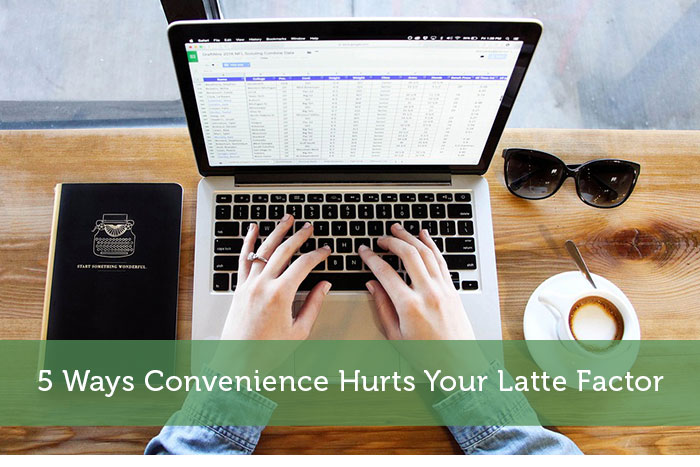“What? How on earth can convenience hurt me in any way,” you ask? Actually, it can do so in at least five ways, as you’ll see from this post on how taking shortcuts can hurt your latte factor.
Leaving Power Drainers On
In the month of Earth Day, it’s suitable to turn to energy use as a significant contributor to wasted money.
If you are like most households, you just brush off utilities as inevitable expenses.
This reasoning causes people to forget that all wasted energy—gas, electricity, water—is literally money down the drain, not to mention its toll on the environment.
Fortunately, there’s an easy fix—for a small investment you can equip your home with sensor lights and water taps which only turn on when you need them to.
To be even more money-efficient you can forgo replacing your fixtures and faucets and go by the following five energy-saving tips:
- Turn off lights you don’t use.
- Opt for the half-flush when you go number 1.
- Turn off the water when you brush your teeth and lather up.
- Don’t crank up the heating/cooling if you can get comfortable dressing up/down.
- Use the eco functions on your appliances such as the dishwasher and the laundry machine.
Subscription Services
From Netflix to The Dollar Shave Club, it seems you can now subscribe to anything.
No doubt, the subscription economy provides convenient, budget-conscious ways to enjoy life.
At the same time, the easiness of one-click subscriptions means people sign up for multiple services, reasoning that a couple of dollars a month is no deal-breaker.
McKinsey reports that 35% of surveyed consumers have 3 and more subscriptions.
It’s one thing if you need and use them, but it’s not unusual to sign up for stuff and forget about it, especially with non-tangible goods.
This means throwing away money that can instead be invested, for example in penny stocks.
Driving Everywhere
While some countries are praised for their green transportation (walking, cycling, and well-organized eco-friendly public transportation) in the US the car is put on a pedestal.
Drive-thru fast food chains, drive-thru grocery stores, even drive-thru banks make it unnecessary for people to leave their cars.
We can also add to the list ride-sharing services which can pick you up and drop you off at your whim.
But driving is associated with many expenses — gas, maintenance, and car payments; not to mention the cost on health and the environment.
Think about how often you have to ride your car vs. how often you feel like taking the car instead of walking/riding a bike/using public transportation.
Cashless Payments
Another modern convenience that’s grown so much that some societies have virtually gone entirely cashless.
But a study published in the Journal of Consumer Research found that people who pay with credit cards value purchases less [PDF] than when paying cash.
When you don’t see money leaving your hands, you think less about it, especially knowing its a credit you’ll payback at your convenience.
Other traps of cashless payments are the payment fees associated with them.
Of course, you don’t need to give up paying cashless.
Instead, split your expenses in recurring ones (like paying the bills) which benefit from being paid cashless and pay cash when buying non-essentials.
Eating Out
Mentioning drive-thrus also warrants talking about eating out.
While it’s understandable that you need variety, there are several problems with eating out.
First, it costs more than cooking at home. Second, unless you are eating at a quality place, you are likely to consume stuff that is bad for your health (which raises your premiums and medical bills). Third, the more you eat out, the more you ingrain it as a habit.
Instead of counting on out-of-home eating as a habit use it as a treat for example at the end of the week after successfully sticking to your budget.
Yep, convenience is nice, but it can also be costly. Laid out above were the five most common shortcuts people take that can add up as unnecessary expenses. While you don’t have to stop enjoying yourself, you can do a quick review of your daily choices and improve your latte factor by cutting costs on things that other than being convenient don’t improve your quality of life.




